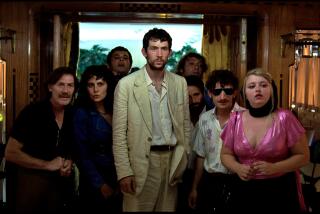Louis Malle and the human side of film
- Share via
The late French director Louis Malle is often described as being one of the New Wave group of filmmakers who burst on the scene in the late 1950s.
But an upcoming retrospective at the Los Angeles County Museum of Art -- “Human, Too Human: The French Films of Louis Malle” -- illustrates that he was vastly different from such New Wave auteurs as Francois Truffaut and Jean-Luc Godard, who believed that directors should put a personal stamp on their movies.
“He doesn’t have that kind of strong signature or personality that Truffaut and certainly Godard did,” says film historian Chris Horak, curator at the Hollywood Entertainment Museum. “There is not that clean line that connects his work.”
He was also the only French filmmaker of that generation who found great success in the U.S., with such movies as 1978’s “Pretty Baby” and 1981’s “Atlantic City,” for which he received an Oscar nomination for his directing.
Malle didn’t get into filmmaking in the same manner as the New Wavists. “He wasn’t a journalist or critic like Godard or Truffaut,” says Horak. “Louis Malle was this rich guy who started working with Jacques Cousteau as an underwater cameraman.”
Malle, who died 10 years ago of cancer, would let the subject matter of his film dictate his approach “rather than force the subject matter to adapt to his dogmas and theories,” says his son, aspiring filmmaker Manuel Malle. His father had an unrelenting curiosity about life and people, says Malle.
“Unlike many other directors of the generation, he didn’t stick to the same theme again and again or the same country. He made documentaries. He was so diverse in his interests.
“At the same time, I think he had an ability -- at least in his films -- to not necessarily judge [his characters] in a simple way of black and white. So, he makes a film about a Nazi collaborator [1987’s acclaimed ‘Au Revoir les Enfants’], a man he abhorred in real life. But rather than just painting him simply as the villain, he also tries to understand to some degree what drives him.”
The retrospective, which starts Nov. 11 at LACMA and continues weekends through Dec. 3, opens with two screenings of the 1974 film “Lacombe Lucien,” a disturbing look at a slow, naive teenager who collaborates with the Nazis in Vichy France.
Also included is his acclaimed 1971 romantic drama “Murmur of the Heart,” which explores a love affair between a mother and son; the controversial 1958 drama “The Lovers,” which was the subject of many court cases in America because of its then-controversial sexual frankness; the recently restored 1957 thriller “Elevator to the Gallows”; the heartbreaking 1963 film “The Fire Within,” featuring a tour-de-force turn by Maurice Ronet as an alcoholic; and two of the last films he made in France, the Oscar-nominated “Au Revoir” and 1990’s “May Fools.”
Malle always dealt with sexual taboos, as in “Murmur of the Heart,” “Pretty Baby” (1978) or the 1992 British production “Damage,” which initially received an NC-17 rating in the U.S.
“He did like to push buttons,” says Manuel Malle. “But I would argue [it was] often not for shock value. But it was something he was curious about. It was not to titillate or take moral judgment on [the characters’] actions.”
Malle worked as a production assistant on “May Fools,” and he recalls that his father was “incredibly intense” on the set. “ It was the work of a passionate man.”
At the film’s completion, those on the set warned Manuel Malle against going into the business because his father had made “May Fools” a memorable experience.
“It was incredibly collaborative and fun,” he says. “I have worked on films since then and they certainly never were as intimate, passionate and fun.”
More to Read
The biggest entertainment stories
Get our big stories about Hollywood, film, television, music, arts, culture and more right in your inbox as soon as they publish.
You may occasionally receive promotional content from the Los Angeles Times.











